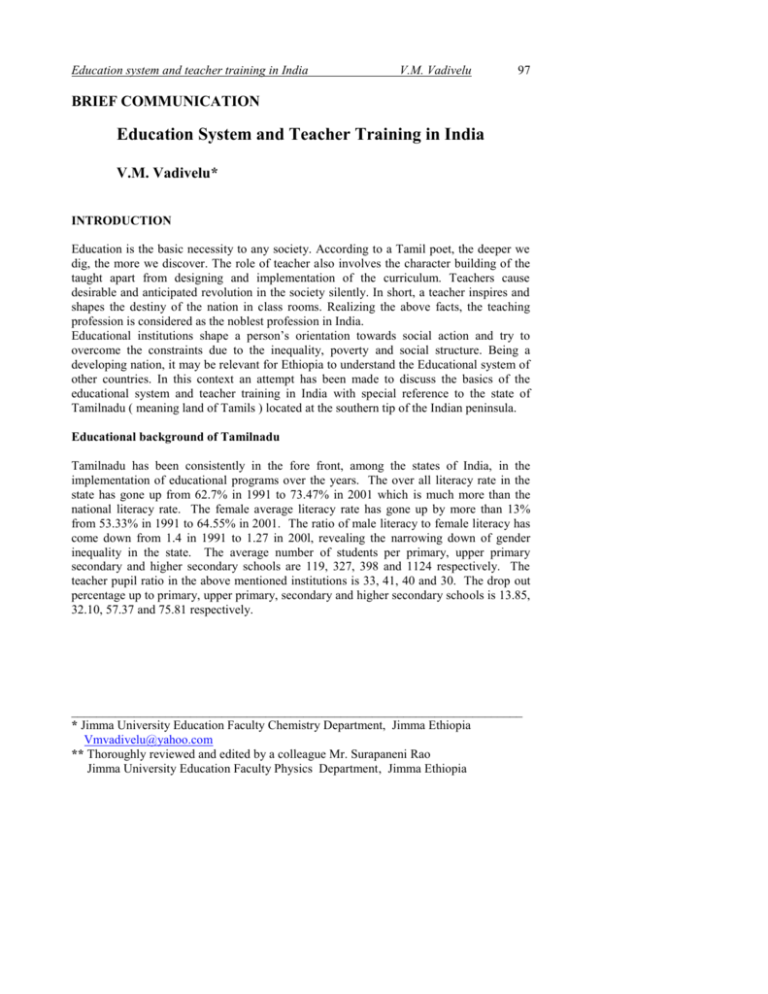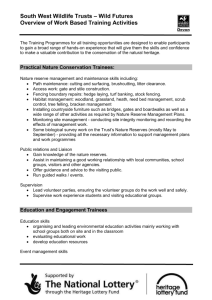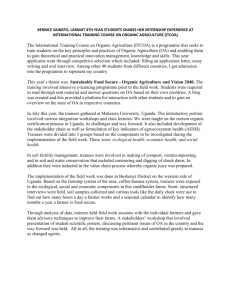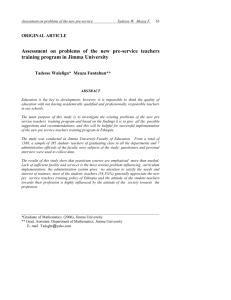Education system and teacher training in India
advertisement

Education system and teacher training in India
V.M. Vadivelu
97
BRIEF COMMUNICATION
Education System and Teacher Training in India
V.M. Vadivelu*
INTRODUCTION
Education is the basic necessity to any society. According to a Tamil poet, the deeper we
dig, the more we discover. The role of teacher also involves the character building of the
taught apart from designing and implementation of the curriculum. Teachers cause
desirable and anticipated revolution in the society silently. In short, a teacher inspires and
shapes the destiny of the nation in class rooms. Realizing the above facts, the teaching
profession is considered as the noblest profession in India.
Educational institutions shape a person’s orientation towards social action and try to
overcome the constraints due to the inequality, poverty and social structure. Being a
developing nation, it may be relevant for Ethiopia to understand the Educational system of
other countries. In this context an attempt has been made to discuss the basics of the
educational system and teacher training in India with special reference to the state of
Tamilnadu ( meaning land of Tamils ) located at the southern tip of the Indian peninsula.
Educational background of Tamilnadu
Tamilnadu has been consistently in the fore front, among the states of India, in the
implementation of educational programs over the years. The over all literacy rate in the
state has gone up from 62.7% in 1991 to 73.47% in 2001 which is much more than the
national literacy rate. The female average literacy rate has gone up by more than 13%
from 53.33% in 1991 to 64.55% in 2001. The ratio of male literacy to female literacy has
come down from 1.4 in 1991 to 1.27 in 200l, revealing the narrowing down of gender
inequality in the state. The average number of students per primary, upper primary
secondary and higher secondary schools are 119, 327, 398 and 1124 respectively. The
teacher pupil ratio in the above mentioned institutions is 33, 41, 40 and 30. The drop out
percentage up to primary, upper primary, secondary and higher secondary schools is 13.85,
32.10, 57.37 and 75.81 respectively.
________________________________________________________________________
* Jimma University Education Faculty Chemistry Department, Jimma Ethiopia
Vmvadivelu@yahoo.com
** Thoroughly reviewed and edited by a colleague Mr. Surapaneni Rao
Jimma University Education Faculty Physics Department, Jimma Ethiopia
Ethiop. J.Educ & Sc.
Vol. 3 No. 1 September 2007
98
This exploding phenomenal growth either in over all literacy rate or female literacy rate in
this state, no doubt, is a dramatic one which prompts us to go into the successful details of
its educational system, the different cadre of teachers who are responsible for such an
astonishing growth and how they are trained. Further Tamilnadu may be considered as
typical and model state reflecting the Indian scenario regarding educational system,
teachers and their training.
Educational system in Tamilnadu
The structure of education in Tamilnadu is based on the national pattern of 10+2+3,
(also 10+2+4 and {10+2+Respective professional course duration} patterns does exist)
consisting of five years of primary and three years of upper primary/middle school
education for the age groups of 6-11 and 11-14 respectively both put together as primary
elementary education, followed by secondary and higher secondary education of two years
duration each. The entry age in standard 1, which is also called as class or grade, is 5 plus.
There are also pre-primary classes for the age group of 3-5.
After secondary or high school education, a student can join higher secondary course or
industrial training institute (ITI) or polytechnic college. The higher secondary school
certificate enables the students to pursue their studies either in universities or colleges for
higher education in general academic stream leading to bachelors’ degree like B.A., B.Sc.,
B. Com., B.C.A., and B.B.A. (of 3 years course duration) and technical and professional
courses such as B.E., B. Tech., B.D.S, ( of 4 years course duration) and M.B.B.S., B.P.T.,
B.L., and E.T.T (elementary teacher training). After graduation, the student can pursue
post-graduation or masters degree course of either two years duration (or) three years
duration. Students can also join the professional courses like B.E.d. or B.L. after under
graduation. On completion of post graduation a student may work for M. Phil. or Ph.D.
degree.
Primary school teachers
They are broadly classified into two categories namely nursery or Montessori school
teachers and primary school teachers. The teachers at this level play a very important role
in society as they are largely responsible for molding the young impressionable minds.
Theses teachers mainly deal with children in the age group of 4-10 years. As the child
comes out of the protected environment of his home for the first time and is away from his
parents, these teachers are a parent substitute. What a child learns and experiences during
his early school years can shape the child’s view about himself and the world around him
which would later play an important role in his success at school work and also his
personal life making him a good social being. Therefore the nursery and primary school
teachers are responsible for the social, emotional and intellectual growth of children.
Upper primary school teachers
Education system and teacher training in India
V.M. Vadivelu
99
At the upper primary school level the teacher’s are responsible for students in the age
group of 11-13 (classes 6-8). They help children to develop their use of languages, explore
mathematical ideas and introduce them to history, geography, science and creative arts.
They also train the students in physical education, music, reading, elocution, dramatics art
and craft. Creative techniques in teaching are used for lower classes, for older students the
teaching is more formal including regular home work and tests.
Secondary and higher secondary school teachers
The secondary and higher secondary school teachers specialize in one or two subjects and
teach those subjects to all age groups in secondary and higher secondary schools. They
prepare the students for the 10th grade and 12th grade examination (conducted by either
State Board or National Board. Further a student has choice to register with either the State
Board or the National Board). More emphasis is given on imparting knowledge of the
subjects and these teachers play an important role in the overall personality development of
the students.
Training of primary, upper primary and secondary higher secondary teachers
The basic educational qualification to enter into an elementary teacher training school,
which offer training to those who later become primary and upper primary school teachers
is a pass in 12th grade. The training extends for a period of two academic years. The
admissions to such training schools are made on merit basis among those who have
applied for the training. There are more than 774 elementary teacher training schools in
Tamilnadn and the total in take of the students is roughly 4380 per academic year. It is to
be emphasized here than nearly 600000 students appear for the 12th grade examination and
only less that 0.008% of these students join in elementary teacher training schools per
annum. Therefore, according to this statistics, the majority of the students who seek
admission in elementary teacher training schools normally have an interest and affinity
towards teaching profession. Thus they become teachers by choice and not by chance.
The academic qualification for the entry in to a college of education is a bachelor degree in
any one of the subjects taught in the secondary school level. Students with post-graduate
degree in any one of the subjects taught in higher secondary school level, are also eligible
for the admission in a college of education. The program is of one year duration leading to
the degree of bachelor of education B.Ed. B.Ed. degree holders with an undergraduate
degree become qualified to teach their concerned subject for 9 th and 10th grade students in
a secondary school and those with post-graduate degree are qualified to handle 11 th and
12th grade in a higher secondary school. Totally there are 22 B.Ed. colleges and 3180
B.Ed. graduates come out as secondary and higher secondary teachers per annum.
Any education oriented program has to have emphasis on both the principles of education
and the mode of impart of knowledge. For example a B.Ed. program with chemistry as a
major subject has to revolve around the means and modes related to impart the knowledge
of chemistry and practical training at or up to secondary or higher secondary school level
for which the concerned resource persons are required to be well equipped with a proper
graduation, post graduation degree in science (B.Sc./ M.Sc.) with chemistry as the main
subject having appropriate combination of allied science subjects (such as, physics and
Ethiop. J.Educ & Sc.
Vol. 3 No. 1 September 2007 100
mathematics, physics and biology, geography and geology and likes). Needles to mention
that these two programs (i.e) B.Sc. and B.Ed. can neither be amalgamated nor can be
acquired simultaneously as they are not only two different graduation programs under
different eligibility requirements but also pertain to two different faculties (i.e.) science
and education respectively. However, when these two degrees are acquired, they become
contingent to each other as the former will enrich in “what to teach” and the later will help
in “how to teach and impart”. Obviously knowing ‘how to teach’ with out acquiring
‘what to teach’ becomes meaningless.
When India was in the early stages of independence there was dearth of Indians for various
jobs connected with the building of infrastructure of the nation. Post graduates, graduates
and diploma holders were just snapped as soon as they come out of the institutions. Even
under such a demanding situation the required academic eligibility to become primary,
upper primary and secondary school teachers was not compromised and diluted, as the
lives of younger generation and hence the development of the nation is entrusted to the
safe hands of a teacher. Then the Indian planners in the field of education were fully
aware of the fact that if fountain head is polluted containers can not be free from
contamination.
The salient features of a teacher training institution whether it is elementary school teacher
training or college of education, are as follows:
1.
There is a rigorous and very serious training.
2.
The teacher trainees should compulsorily stay in the hostel attached to the
institution.
3.
The institution will be situated in rural area, as far as possible away from the
urban area.
4.
There are supervisors to monitor the day-to-day activities of the trainees.
5.
The students are trained to get up early in the morning and to do some physical
exercise to keep them physically and mentally fit.
6.
Dress code for the trainees will be strictly followed.
7.
Every day before the breakfast there will be a prayer for 15 minutes
8.
Very strict rules and regulations regarding the discipline of the trainees will be
followed. Any trainee found not abiding by the prevailing rules and regulations
will be terminated from the institution after sufficient warring.
9.
In the evenings, a group of students will be engaged in playing games and the
other group of students will be working in the kitchen garden of the institution
from where they get part of vegetables and greens. These groups will be
exchanged once in a week.
10. Study hours will be strictly maintained in the evening after dinner under the
supervision of the instructors from (06.00 to 08.00) P.M.
11. Certain primary and upper primary schools will be attached to elementary
teacher training schools and secondary and higher secondary schools will be
attached to college of education where the trainees will have teaching practice
periodically through out the period of their study.
12. In order to develop the trainees as good administrators and to bring out their
leadership qualities in them various committees like mess committee, purchase
Education system and teacher training in India
13.
14.
15.
16.
17.
18.
V.M. Vadivelu
101
committee recreation committee, accounts committee, games committee etc are
formed among the students to look after the day to day affairs of the hostel
The members of various committees will be exchanged cyclically once in a
month to ensure the transparency both financial as well as administrative.
To create political awareness among the trainees, mock-parliament will be
conducted every week, where a group of trainees will assume the role of ruling
party and others will act as the members of the opposition party. The subject for
the debate will be either the important political incident of that week in the
nation or the institution or the hostel.
In order to develop the practice of savings and regulating their expenses each
and every institution will have a mini bank known as Sanjayeka Savings Bank
which will be operated by a committee of students and supervised by a teacher.
There will be a co-operative store in the institutions managed by the students
where the students can purchase their needs cheaply.
Days of national importance like Independence Day, Republic Day and Teachers
Day will be organized and celebrated by the trainees in a grand manner.
Free medical camps will be arranged periodically which will be sponsored by the
philanthropists. Trainees will take all efforts to bring the suffering to the camp
and get treated.
The trainees will also be provided a special training in first aid and are deployed
to serve the people in the event of national calamity like cyclone and flood. May
be this develops the necessary patience and service oriented attitude which are
the two eyes of a teacher.
Generosity is the most important to human beings in general and teachers in particular.
Lord Rutherford, the Nobel Prize winner who discovered the presence of nucleus in an
atom, had been one of the outstanding examples of teachers who had taken interest in the
work of his students. Instead of trying to attract more attention to his own work,
Rutherford identified and motivated a number of his student researchers who made note
worthy discoveries in the later period. This essential quality of generosity is developed in
the minds of trainee teachers so as to share their knowledge with the students generously
and whole heartedly.
Any profession is inherent with certain discomforts depending on the nature of the
profession, and it is applicable to teaching profession also. But during the training period
they are made to understand the discomforts of the profession which is an essential part of
discharging any profession. “Devotion to profession is the highest form of worship of
God”, says Swami Vivekananda. They are trained to devote themselves to their profession
gradually.
Water never assumes or imposes a shape. The formless one alone can have so many forms
representing zero-ego state. The trainee teachers are gradually brought to such a state of
zero egoism over the period of their training.
Any growth would be considered complete only when it is associated with the growth of
spiritual component in human being. Science can not answer every thing, for example, the
questions regarding love, faith and beauty. However science and spirituality are similar in
Ethiop. J.Educ & Sc.
Vol. 3 No. 1 September 2007 102
their quest to understand the secrets of life. During the training period students acquire
spiritual understanding of life to a certain degree which is necessary not only to maintain
emotional equanimity while experiencing difficulties but also to be generous, to critically
analyze things and tend towards zero ego state. Chinese philosopher Confucius says “I
hear, I forget; I see, I remember; I do, I understand. The trainees are provided practical
training in almost all fields pertaining to education and social life. As Confucius says, as
they do, they understand and follow.
The nature of training that one undergoes in such a teacher training institution transforms
him not only as a good teacher but also a good citizen, administrator, substitute for parent
and social worker.
The trainees are made to realize that they are supposed to live up to the reputation and
expectation of their profession.
After graduation, they come out knowing fully well about the significance of their
profession in the society and that they are entering in to a more responsible phase of life in
which they need to have more commitment and discipline.




